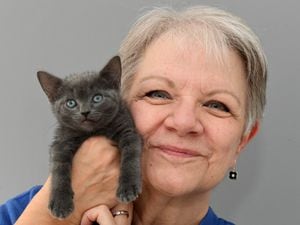Bank job: We meet Jayne Tinson who's worked in banking for 14 years
Banks and building societies are closing hundreds of branches on Britain's high streets every year.

It's been estimated that almost 60 branches will disappear from villages, towns and cities each month
They say it's due to a drop in demand because increasing numbers of customers are switching to online banking and mobile phone apps.
And while technology can certainly be faster and more convenient, it's not always for everyone.
Many people would still prefer to walk into their own branch to ask a member of staff face to face for money advice than conduct their financial business via their computer or smartphone.
For those less familiar with the latest technology or those who simply don't trust it, it can all seem overwhelming and they can feel they are being cut off from banking.
To ensure they don't lose customers, banks are having to find new ways to ensure they can still provide a personal touch to those who still want it and also help assure those with concerns about banking online.
Some, such as LLoyds Bank and Bank of Scotland, have opted to take to the road on four wheels with mobile branches, especially to help those living in rural communities.
NatWest has also branched out with its army of community bankers who are out and about offering face to face assistance and support.
Jayne Tinson, who covers Stafford and Stone, is one of the 89-strong team and has worked in the banking industry for 14 years.
She is passionate about customer service and helping people to access the services that are important to them and their families.
"I love it, every day is different. We're bringing the bank to the people. Where banks have closed, we've been in the community helping people with their banking," says Jayne who has been the community banker for north Staffordshire for around six months.
The team holds regular drop in clinics in libraries, places of work, clubs, leisure centres and also goes out to customers' homes.
Following the closure of NatWest's branch in the centre of Stone, Jayne has been holding a surgery for customers at Stone Library between 10am and 1pm on Thursdays.
She says the number of people she sees each time she holds a clinic can vary but her customers tend to be of all ages, ranging from students to the elderly.
Help on offer includes free financial health checks to if new products or services may be appropriate to their needs and priorities.
During her surgeries Jayne can also help people understand the different ways to bank and find the best one for them.
If somebody is in a residential home or can’t get out of their house to visit her at one of her clinics, then she can arrange to visit them at home to assist them with their banking needs.
While Jayne can also support customers who are using online banking or the mobile app on phones or tablets for the first time by showing them how to check statements and do transfers and payments.
"I visited a 93-year-old lady who wanted education about online banking. I sat with her and talked her through it.
"She rang me the other day to say how amazing it was," the 48-year-old, who lives in Nantwich,tells us.
"People love the face to face element," she adds.
Community bankers don't carry any cash or customer details and they can't pay in cheque on someone's behalf.
"If people want to cancel a standing order we can do that but we can't take money off them. They can use the post office in Stone to pay in money," explains Jayne.
If a customers wants to apply for a mortgage or open a savings account, the community banker can guide them through doing this online, or explain how to do it by phone or post.
Jayne has worked for Natwest, which also has a mobile branch service, since she began her career and has worked in personal and private banking.
But the best of her job is carrying out school visits as part of NatWest's MoneySense financial education programme for five to 18-year-olds.
It aims to teach basic financial skills and help young people understand the consequences of poor money management, gambling and the effects that becoming victim to a fraud or scam can have on mental wellbeing.
"Going into schools is my favourite thing to do. It's a great experience and the children get a lots from it.
"As a bank we believe that children should get lots of experience with money as some of them leave school not knowing what money is," says Jayne, who also provides advice via her Twitter account.
One of the biggest concerns some people have about online banking is the fear about whether it's safe or not and how people can make sure that no one else gets their hands on their money.
Her busy role also involves helping people of all ages to learn how to spot scams and ensure they know how to protect themselves, family and friends.
Jayne gives presentations to different community groups, rotary clubs and colleges to share her advice and promote the Friends Against Scams campaign – run by National Trading Standards since 2016 and aimed at reducing the number of people falling victims to criminal scams.
"It's better to prevent fraud before it happens. We're educating people about fraud and how to stop fraud," she says.
“The aim of Natwest is to have educated one million customers on fraud through Friends Against Scams by 2020 and a community banker can help and support
"Friends Against Scams aims to protect and prevent people from becoming victims of scams and empowers communities to 'take a stand against scams'," adds Jayne.





